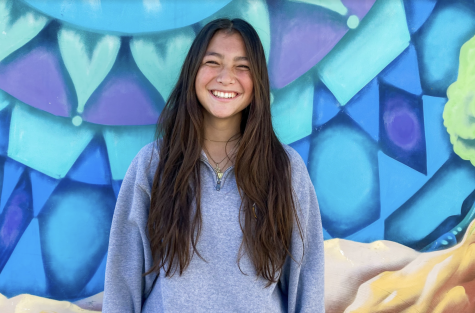OPINION: Town Hall missed opportunity to address anti-Asian hate
No swastikas, but still deadly
BP Photo Illustration by Eli Weiss
EXPERIENCE: Freshman Tomomi Shaw said she has experienced anti-Asian taunts on her way home from school.
April 7, 2021
On March 16, Robert Aaron Long shot and killed eight people in Cherokee County, Georgia, six of them of East Asian descent. Just three days later, the school joined together for Town Hall. I was expecting the topic would be about hate crimes against Asians, which have escalated by 150% this year in the U.S,
But it was not. Although the topic chosen, cancel culture, was still relevant and important, why didn’t we talk about Asian-American people being racially profiled, killed, harassed and assaulted?
Cherokee County’s sheriff’s spokesman Capt. Jay Baker stated that Long was having a “bad day,” and that that was his motivation for the shootings. Why does the excuse of having a “bad day” make it permissible to kill people in three different locations?
Since not all the victims were of Asian descent, many believe the shootings were not hate crimes. Long himself denied that he was motivated by the race of the parlor owners. However, the fact that all of the businesses were Asian-owned, and that six of eight of the victims were Asian, cannot be ignored.
The threat of anti-Asian violence is hard to identify because it does not have a particular symbol, like a swastika. The hate that Asian Americans have gone through comes as harassing women, the elderly, and men just on the street. There have been numerous attacks in public, including beatings, being spit on, and in some cases racist letters sent to Asian-owned businesses. People have been verbally abused and mocked, with words like “Go back to your country” or “We don’t want your disease,” and even making fun of the accents Asian immigrants have while speaking English.
Personally, as someone who identifies as Asian-American, I myself have experienced several instances when people rolled down their car windows and yelled “China flu” at me. One was on my way home from school, on Olympic Boulevard a ways beyond the student parking lot. My cousins and some friends have also experienced this.
Some people partly justify the Georgia murders — or at least say they were not caused by racial hate — because they suspect there was illegal activity going on in these massage parlors. But Judaism has no tolerance for this view. The Gemara in Bava Kama 8:1, in talking about the words “An eye for an eye,” states “And you shall not take kofer” — ransom — “for the soul of a murderer.” It says you should never take the soul (the life) even of a criminal, no matter the severity of the crime. Even if the individuals associated with these massage parlors were involved in illegal activity, there are legal processes that could have been applied, rather than violence targeted against a stereotype.
It is important for Shalhevet students to talk about hate crimes outside the context of anti-semitism. As Jews, we have over many generations developed an effective voice to speak out and fight hate. I would hope for this awareness to support the Asian American – Pacific Islander community as well, to help students learn to speak out against those who discriminate against others and to show support to all communities that are being targeted.
In the future, I hope we can discuss all that is happening outside of the LA Jewish community, and not just what affects Jews.














